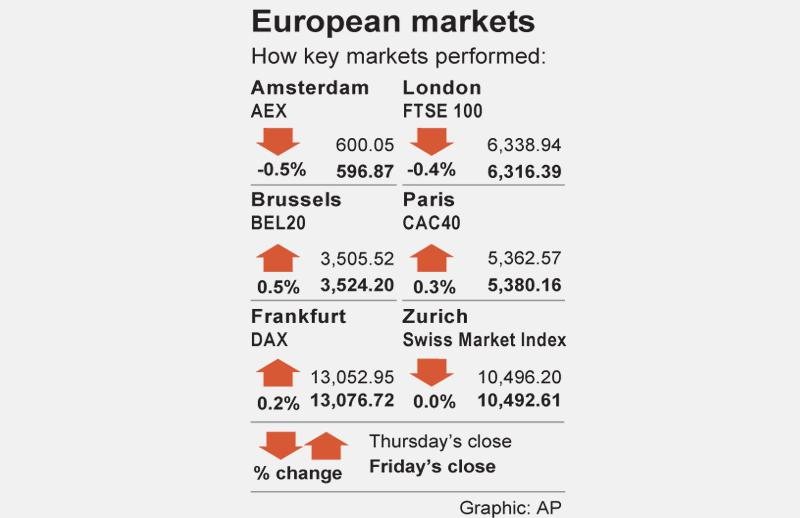European shares ended flat on Friday as surging COVID-19 cases compounded fears of the damage to the bloc’s economy in the coming winter months, although the benchmark index clocked its second straight week of gains.
The pan-European STOXX 600 edged 0.01 percent higher after jumping earlier this week on optimism about a working COVID-19 vaccine.
The index has gained 12.5 percent in the past two weeks, also buoyed by hopes of calmer global trade under US president-elect Joe Biden.

“Even if the greater likelihood of a vaccine has brightened prospects for next year, the near-term economic outlook is still very gloomy,” Capital Economics Ltd Europe economist Jessica Hinds said.
“Much of the eurozone is yet again subject to substantial restrictions on daily life that are taking their toll on economic activity, particularly in parts of the services sector,” Hinds said.
German Minister of Health Jens Spahn said it was too early to say whether restrictions imposed last week would need to be extended beyond this month, while French Prime Minister Jean Castex said there would be no easing for at least two weeks.
German shares rose 0.2 percent, while France’s CAC 40 index gained 0.3 percent after having risen to an eight-month high earlier this week.
Despite rallying more than 40 percent since a coronavirus-driven crash in March, the STOXX 600 is down about 7 percent this year on concerns that the second round of lockdowns would threaten a nascent economic recovery.
The S&P 500, in contrast, has risen 9.5 percent so far this year.
With the eurozone likely heading back into recession this quarter, the European Central Bank has already said it would provide more stimulus next month.
European banking stocks outperformed major sectors surged 16.5 percent this week, while travel stocks, which have lost 25 percent of their value so far this year, ended their second week higher.
Technology stocks, which have tracked a surge in their US peers as investors gravitate toward sectors that have seen higher demand in this year’s stay-at-home environment, gained 0.3 percent on Friday.
French power group EDF SA gained 0.4 percent as it showed signs of improving performance in the third quarter, while German property group Deutsche Wohnen AG fell 1 percent after its third-quarter earnings update.
Overall, quarterly results for STOXX 600 companies have been better than expected, with 68 percent of the firms that have reported results so far beating analysts’ earnings estimates, according to Refinitiv data.

South Korea’s equity benchmark yesterday crossed a new milestone just a month after surpassing the once-unthinkable 5,000 mark as surging global memory demand powers the country’s biggest chipmakers. The KOSPI advanced as much as 2.6 percent to a record 6,123, with Samsung Electronics Co and SK Hynix Inc each gaining more than 2 percent. With the benchmark now up 45 percent this year, South Korea’s stock market capitalization has also moved past France’s, following last month’s overtaking of Germany’s. Long overlooked by foreign funds, despite being undervalued, South Korean stocks have now emerged as clear winners in the global market. The so-called “artificial intelligence

NEW IDENTITY: Known for its software, India has expanded into hardware, with its semiconductor industry growing from US$38bn in 2023 to US$45bn to US$50bn India on Saturday inaugurated its first semiconductor assembly and test facility, a milestone in the government’s push to reduce dependence on foreign chipmakers and stake a claim in a sector dominated by China. Indian Prime Minister Narendra Modi opened US firm Micron Technology Inc’s semiconductor assembly, test and packaging unit in his home state of Gujarat, hailing the “dawn of a new era” for India’s technology ambitions. “When young Indians look back in the future, they will see this decade as the turning point in our tech future,” Modi told the event, which was broadcast on his YouTube channel. The plant would convert

‘SEISMIC SHIFT’: The researcher forecast there would be about 1.1 billion mobile shipments this year, down from 1.26 billion the prior year and erasing years of gains The global smartphone market is expected to contract 12.9 percent this year due to the unprecedented memorychip shortage, marking “a crisis like no other,” researcher International Data Corp (IDC) said. The new forecast, a dramatic revision down from earlier estimates, gives the latest accounting of the ongoing memory crunch that is affecting every corner of the electronics industry. The demand for advanced memory to power artificial intelligence (AI) tasks has drained global supply until well into next year and jeopardizes the business model of many smartphone makers. IDC forecast about 1.1 billion mobile shipments this year, down from 1.26 billion the prior

People stand in a Pokemon store in Tokyo on Thursday. One of the world highest-grossing franchises is celebrated its 30th anniversary yesterday.